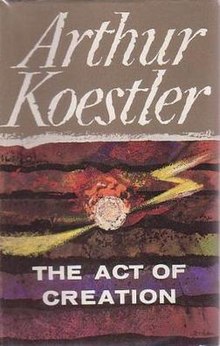 First UK edition | |
| Author | Arthur Koestler |
|---|---|
| Language | English |
| Subject | Psychology |
| Publisher | Hutchinson (UK) Macmillan (US) |
Publication date | 1964 |
| Publication place | United Kingdom |
| Media type | |
| Pages | 751 |
The Act of Creation is a 1964 book by Arthur Koestler. It is a study of the processes of discovery, invention, imagination and creativity in humour, science, and the arts. It lays out Koestler's attempt to develop an elaborate general theory of human creativity.
From describing and comparing many different examples of invention and discovery, Koestler concludes that they all share a common pattern which he terms "bisociation" – a blending of elements drawn from two previously unrelated matrices of thought into a new matrix of meaning by way of a process involving comparison, abstraction and categorisation, analogies and metaphors. He regards many different mental phenomena based on comparison (such as analogies, metaphors, parables, allegories, jokes, identification, role-playing, acting, personification, anthropomorphism etc.), as special cases of "bisociation".